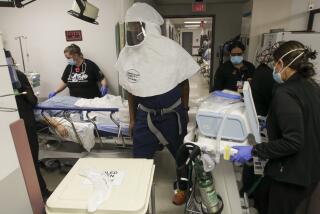AIDS Workers’ Infections Laid to Ignoring Rules
- Share via
WASHINGTON — Federal officials, describing as “rare events” the AIDS infections of three health care workers who had come in contact with contaminated blood, said Wednesday that the cases demonstrate the need for “vigorous adherence” to infection control guidelines.
“If the recommendations and guidelines that existed out there had been followed, these cases wouldn’t have occurred,” Donald A. Berreth of the federal Centers for Disease Control in Atlanta, said in an interview.
But, in New York, the National Union of Hospital and Health Care Employees issued a statement Wednesday calling for “immediate meetings” with the secretaries of the Labor and Health and Human Services departments to discuss more stringent enforcement of CDC guidelines for workers who care for AIDS patients.
On-the-Job Infections
The three cases are the first documented incidents of on-the-job infections of hospital workers that did not involve accidental needle pricks or prolonged exposure to AIDS-contaminated body fluids.
They were described in an issue of the CDC’s Morbidity and Mortality Weekly Report, to be published this week.
One of the workers was in contact with the blood of an AIDS patient for about 20 minutes at a time when her hands were chapped, the report said. She was not wearing gloves. Another worker believes that she may have touched a rash on her ear when handling blood that had spilled from a blood-separating device. The third was splattered in the face and mouth with infected blood in a laboratory accident.
CDC officials said that the AIDS virus may have invaded their bodies in these ways.
Goggles Suggested
Guidelines issued by the CDC in 1985 and 1986 recommended that health care workers wear gloves when they might be exposed to blood. For “persons with more extensive contact” with blood or “potentially infective body fluids,” the CDC has said goggles, gowns, masks or safety glasses are advisable.
Berreth said each of the cases involved “breaks in technique.”
Officials said that none of the three workers infected had any other known risk factors for the disease, such as intravenous drug use or sexual relations with an infected person.
After contact with the blood, two of the three workers later suffered flu-like symptoms. All three subsequently tested positive for the AIDS virus.
Officers of the hospital workers’ union said that adherence to the guidelines is sometimes lax and that that must change.
Use of Gloves Stressed
“It is not now taken as a matter of course that a health care worker puts on a pair of gloves before he or she does his or her job,” said Laura Job, director of the union’s occupational safety and health program. “And it should be.”
Health care professionals who care for AIDS patients said they were particularly concerned to learn that CDC recommendations had not been strictly observed.
“We’ve worked with AIDS patients for a long time,” said Donna Stidham, a nurse-epidemiologist at Sherman Oaks Community Hospital, which operates an 18-bed AIDS unit in Los Angeles’ San Fernando Valley. “We’ve known the precautions that need to be taken, and we’ve followed them. If you follow those, you can prevent exposure.”
“In a hospital setting, whenever you come into contact with blood, no matter whose it is, you need to view that blood as potentially infectious,” said Dr. Robert T. Schooley of Massachusetts General Hospital in Boston.
Schooley, author of the first major study indicating that health care workers face little risk of infection from treating AIDS patients, stressed that, in the three cases, the exposure was not “casual contact. This is very important for people to realize.
‘Invasive Procedures’
“These are patients in the hospital who are having invasive procedures done and are bleeding, and where large volumes of blood are coming in contact with lesions on the skin or in the eyes.”
Still, Kathy McDonnell, a registered nurse who cares for AIDS patients at Century City Hospital in Los Angeles, said: “It’s very frightening. It’s true, we do get accidental exposures, and you cannot say unequivocally there is no risk.”
McDonnell said she had felt “genuine panic” when she first heard of the three infections. But she said that she quickly relaxed when she learned the details, deciding: “I’m just as afraid of being hit by a car in Los Angeles.”
Staff writer Marlene Cimons contributed to this story.
More to Read
Sign up for Essential California
The most important California stories and recommendations in your inbox every morning.
You may occasionally receive promotional content from the Los Angeles Times.













